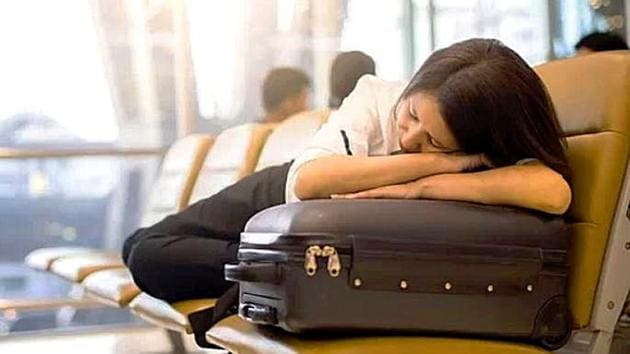The modern world of international travel comes with a peculiar challenge that can derail even the most seasoned travellers: jet lag. As our bodies struggle to align with new time zones, we often find ourselves fighting fatigue, mood swings and disrupted sleep patterns.

However, recent research suggests that with the right approach, we can significantly reduce these effects and adapt more quickly to new time zones. Jet lag occurs when rapid travel across time zones disrupts our circadian rhythm—the body’s internal clock that regulates our sleep-wake cycle.”
As Dr Sarah L Mednick, Sleep Researcher and a cognitive neuroscientist at the University of California in Irvine stated, “Our circadian rhythms are finely tuned to our environment and when we travel across time zones, we essentially disrupt this delicate system. Understanding how to navigate this disruption can make all the difference.”

While this disruption affects everyone differently, the impact tends to worsen with age. The good news is that we can implement strategic interventions to minimise jet lag’s effects by understanding the science behind our body’s timing system.
The direction matters
In an interview with HT Lifestyle, Varun Shetty, Co-Founder, Director and High-Performance Coach at Invictus Performance Lab, shared, “One crucial factor in managing jet lag is travel direction. Eastward travel typically poses a greater challenge than westward travel. This asymmetry exists because most people find it easier to stay awake later than to fall asleep earlier. When travelling east, you’re essentially asking your body to compress its natural day, while westward travel extends it.”
The power of pre-travel preparation
For eastbound flights, Varun Shetty suggested, “Preparation should begin at least two days before departure. The key is to gradually shift your wake time 30-45 minutes earlier each day. This adjustment should be accompanied by immediate exposure to bright light upon waking, early caffeine consumption, and morning exercise within 60 minutes of rising. These three elements—light, caffeine, and physical activity—work together to shift your internal clock.”

Dr Phyllis C Zee, a leading expert in circadian rhythm research, emphasised this and noted, “Preparing for a trip isn’t just about packing bags; it’s about preparing our bodies for a smoother transition into new time zones. Simple adjustments to sleep and light can significantly lessen the impact of jet lag.”
Varun Shetty revealed, “Westbound travellers face an easier adjustment but can still benefit from preparation. The strategy here involves delaying daily routines by 30-45 minutes, including wake time, caffeine intake, and exercise. Additionally, exposure to bright artificial light in the evening helps prepare the body for later bedtimes.”
The temperature minimum: Your circadian navigation tool
Varun Shetty highlighted, “A critical yet lesser-known factor in combating jet lag is understanding your temperature minimum—the point in the 24-hour cycle when your body temperature is at its lowest. This typically occurs about two hours before your natural wake time. By managing light exposure around this crucial period, you can effectively reset your internal clock.”

He advised, “For eastward travel, seek bright light exposure one to two hours after your temperature minimum (based on your home time zone). Conversely, for westward travel, light exposure should occur one to two hours before your temperature minimum. This timing is critical—getting it wrong can worsen jet lag symptoms rather than alleviate them.”
Strategies upon arrival: Adapting faster
Once you have reached your destination, certain practices can accelerate adaptation as per Varun Shetty –
- Align Meal Times: Following the local meal schedule helps regulate your body clock. Fasting for 14- 16 hours before your first meal in the new time zone can also aid adjustment.
- Use Portable Light Devices: When natural sunlight is unavailable, bright light therapy devices (5,000-10,000 lux) can mimic daylight to help reset your circadian rhythm.
- Block Blue Light in the Evening: Wearing red-lens glasses or using apps that filter blue light can promote melatonin production, aiding restful sleep.
- Engage in Regular Exercise: Morning physical activity in your new time zone reinforces your body’s alignment with local time. Even a short walk can positively impact your circadian adjustment.
Busting jet lag myths
Reaching for a glass of wine or pop a sleeping pill during your flight might be tempting but these quick fixes often backfire. Varun Shetty explained, “Alcohol can leave you dehydrated and disrupt your sleep, making recovery harder once you land. Sleeping pills, on the other hand, can cause grogginess and throw off your internal clock even more. Instead, keep it simple—stay hydrated, get the right amount of light exposure, and incorporate small activities like stretching or walking to ease the transition into a new time zone.”
Making jet lag a thing of the past
Varun Shetty concluded, “Jet lag doesn’t have to put a damper on your travel plans. By tapping into the science of your body’s internal clock, you can take proactive steps to feel energised and ready, no matter where you land. Small adjustments, like managing your light exposure, timing your meals, and using travel-friendly tech, can make a world of difference.”
For frequent travellers—whether jetting off for work or a dream vacation—managing jet lag isn’t just helpful; it’s essential. These simple, science-backed strategies can help you leave jet lag behind and focus on enjoying both the journey and the destination.
Disclaimer: This article is for informational purposes only and not a substitute for professional medical advice. Always seek the advice of your doctor with any questions about a medical condition.










